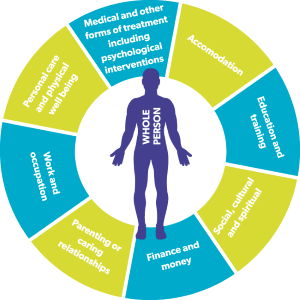 Occupational Therapy
Occupational Therapy
What is Occupational Therapy?
https://www.youtube.com/watch?v=ncKAcM4BAt4
Hear from Penny, an Occupational Therapist, about what Occupational Therapy involves:
https://www.youtube.com/watch?v=ncKAcM4BAt4
Hear from Penny, an Occupational Therapist, about what Occupational Therapy involves:
Why choose Occupational Therapy?
-
Empower other people to carry out everyday tasks they want or need to do.
-
Work with people to improve their psychological and emotional well-being, as well as their physical needs.
-
Able to work in a variety of settings, including hospitals, community facilities, schools, businesses, prisons and clients' own homes.
-
Good graduate prospects. Most universities have at least 80% of their students entering employment within six months of graduating.
“My name is Charlotte, a second year Occupational Therapy student. I chose this career because I wanted to help people, but nursing and medicine wasn’t for me. I love the idea of empowering people to take control of their own condition or impairment. Its unique and exciting helping people to recognize their personal strengths and problem-solving the activities they want, need or have to do in their daily lives. It’s so interesting to find out what is meaningful to different people and how we can use it to regain independence.”
"Occupational therapy (OT) is a science degree-based, health and social care profession, regulated by the Health and Care Professions Council. Occupational therapy takes a “whole-person approach” to both mental and physical health and wellbeing and enables individuals to achieve their full potential” (Royal College of Occupational Therapists)
The ‘whole-person approach’ is illustrated in the image below. This means an Occupational Therapist will aim to help a person with all parts of their health and wellbeing – both mental and physical.
The Whole Person Approach

Occupation
What do we mean by ‘occupation’ and how can it improve your health?
Think of three activities that you value doing independently, i.e. activities that you like to do without relying on help.
Think of an activity for each of the following categories:
-
Self-care, e.g. styling your hair, having a bath, making your own meals, meditation.
-
Productivity, e.g. studying, volunteering, babysitting your brother, going to school/college.
-
Leisure, e.g. gaming, socialising, crafts, sport, reading, walking the dog.
Everyone categorises things differently based on their individual roles, interests and values in life. For example, going for a run could fit into any of these categories depending on the person.
Record an activity for each category below. (You may also like to make a separate note of these as you will need to remember these for the next part of the activity.)
Occupations
These are your occupations. Occupation means ‘activity’. Aiming for a daily balance between these three categories will improve your health and wellbeing.
Part of being an occupational therapist is empathising with the huge impact it can have on someone’s life when they are no longer able to do something that’s important to them. We all experienced this in lockdown. Think about how it affected you physically, mentally and socially. What were the positives and negatives? How easy has it has been to pick these activities up again?
How do Occupational Therapists Help?
Let’s take an example from the leisure category. How might having a stroke affect someone being able to go out for food with friends or family?
Consider the following symptoms of a stroke:
-
Physical: unable to use your left arm, fatigue
-
Cognitive: reduced memory and concentration, difficulty reading and writing,
-
Social: difficulty speaking with muscle weakness in the left side of the face
What might this person have difficulty with?
These are some suggestions:
Physical:
-
Holding the menu
-
Using cutlery and eating food with dignity
-
Having enough energy to be there
-
Getting their card out of their wallet to pay
-
Using the toilet
-
Texting to arrange things
-
Putting a coat on
-
Tying shoelaces
Cognition:
-
Reading or understanding the menu
-
Making decisions on food
-
Keeping up with the conversation
-
Navigating signs in the restaurant to the exit and toilet
Social:
-
Feeling different, embarrassed, looked at or left out
-
Holding conversations and remembering what was said
-
Communicating their order to the waiting staff
-
Anxiety about recovery and the future
This could all lead to cancelling future arrangements, stress and social isolation
How could you problem-solve this? What support could help?
You may have other ideas, but here are a few suggestions:
-
Build confidence and skills in simpler situations first using the support of family and professionals. Encourage the person to practice at home in daily situations and using appropriate assistive equipment like adapted cutlery, an adapted wallet or bag to reach their card easily. They could consider buying less noticeable items that don’t highlight disability as much.
-
They could socially start small, inviting close, understanding friends over for takeaway pizza which is easy to eat one handed without cutlery. Then increase the difficulty as recovery and confidence improves to more people and public spaces.
-
Prioritise and pace tasks during the day beforehand in a way which saves energy for this. They could choose restaurants where they know the menu well, or select what to eat using online menus before arriving. Perhaps asking a close friend to communicate this to the waiting staff.
What skills do you need in Occupational Therapy?
An Occupational Therapist might use an activity as the end goal, e.g. getting back to doing skateboarding, shopping or driving after someone’s been unwell.
Or an Occupational Therapist might use an activity for its therapeutic benefits, e.g. walking in nature when feeling stressed, or using a local dance class to meet new friends.
Take a look at this video for some examples of interventions in different settings:
Interventions Video
Key Skills
These are some of the key skills need to be an Occupational Therapist:
-
People skills
-
Communication
-
Empathy
-
Compassion
-
Inclusivity
-
Positivity
-
Problem solving
-
Creativity
-
Time Management
-
Patience
-
Organization
-
Team working
What's it like as a Student Occupational Therapist?
Charlotte’s experience:
“Typically, Occupational Therapists will work out what someone can currently do, what they want to be able to do, then work out ways of enabling them to achieve it. We are taught how to help people practice these activities in a safe space, adapt the environment and providing creative equipment to make things easier. We are also taught therapeutic techniques to build a trusted relationship and increase someone’s sense of capability and belonging. We become skilled at breaking down seemingly impossible tasks with a particular impairment, then problem solving ways to overcome barriers to everyday living. This improves health, wellbeing, dignity and independence.”
“A typical day of teaching switches between a few hours of lectures followed by a few hours experimenting with these new skills in practical workshops. We are given opportunities to see what it feels like doing the therapeutic activities we might prescribe, for example a day in a community garden, or learning new skills like pottery or cycling in nature. During the three placements I can experience three different settings, for example going out to people’s homes, rehabilitation or hospital settings, schools or mental health services. I’m given a 1:1 educator who works in that role to shadow, to find out what they do and practice skills I’ve learnt or are interested in. We tick off goals we’ve have set together and get a taste for the diverse world of Occupational Therapy.”
How do you become an Occupational Therapist?
“I was unsure what I wanted to do until aged 28! I waitressed during college, kept my options broad with an English Language degree then shadowed various publishing roles. I did temp jobs as ‘paid work experience’, travelled and worked in book publishing and marketing for a few years. Then my Nana had a stroke and lost her independence overnight. I discovered Occupational Therapy and moved back home to career change. I shadowed an OT in a neuro rehabilitation setting; a teacher and OT in a special needs school; local stroke association workshops; and volunteered as a hospital dementia volunteer. I got a job as a Therapy Assistant in a hospital setting for 6 months to try it out, which was incredibly useful. I then began the course – the best decision I’ve ever made! I have worked as a part-time Rehabilitation Assistant, Student Ambassador for UWE, and as ‘bank’ casual staff during the summers. Even if it’s not for you now, there is lots of funding support to come back to it in the future.”
Options
Option A
-
Complete an approved degree university course in Occupational Therapy. This is usually a BSc (Hons) degree taking 3 or 4 years full-time, however there are part-time/in service options if you are working in a relevant role. Employers may cover the cost of your course.
Entry Requirements
Usually 2 or 3 A levels, along with 5 GCSEs (grades A-C/4-9), including English Language, Maths and Science.
Alternative qualifications
The following may be accepted:
-
BTEC, HND or HNC which includes biological science
-
Relevant vocational qualifications
-
Science-based access course
-
Equivalent Scottish or Irish qualifications
-
Register with the Health and Care Professions Council (HCPC).
Option B
-
Complete a degree apprenticeship in Occupational Therapy.
-
Register with the Health and Care Professions Council (HCPC).
Option C
-
Compete a postgraduate Masters in Occupational Therapy (usually 2 years).
Entry Requirements
A relevant degree and healthcare experience.
-
Register with the Health and Care Professions Council (HCPC).
Interested in this Career?
Charlotte says: “Try shadowing Occupational Therapists in different settings, volunteering or working as a Therapy Assistant or Support Worker. Talk to everyone about your ideas. You’ll be surprised how many people have a sibling, friend or parent you can shadow in the job role for a day. This will help you to decide what you do or don’t like. People are very happy to help so don’t be afraid to ask, change your mind or take a leap!”
How do you feel now?
Rate how you are feeling now about Occupational Therapy by using the sliding scales below.
